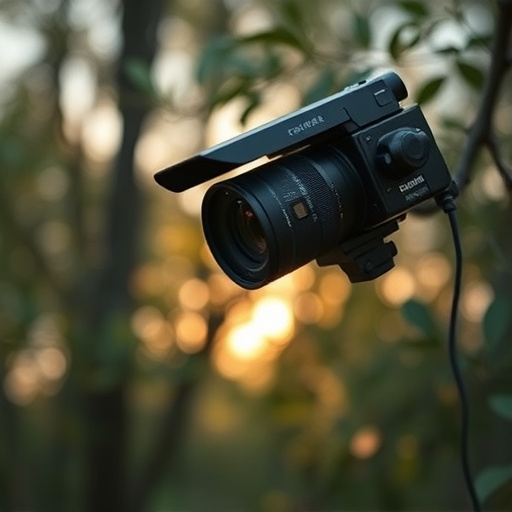In today's digital era, hidden cameras embedded in everyday objects pose a significant threat to individual privacy. Consumers must be vigilant, securing smart gadgets, checking second-hand items, and staying informed about privacy laws to protect their spaces from these miniature surveillance devices. Balancing convenience with security is crucial, as advocates and critics debate the ethics of integrated surveillance in smart homes. Proactive measures, awareness, and legal compliance are essential to safeguard personal moments and maintain control over data in a world where hidden cameras become more advanced and concealed.
In today’s tech-driven world, miniature surveillance devices disguised as everyday home objects are becoming increasingly common. This article explores the hidden dangers of these tiny cameras, known as hidden or spy cameras, and how they can invade personal privacy. We delve into various aspects, including their prevalence in smart home devices, potential security risks, methods for identification, and legal considerations surrounding their use. Learn how to protect your personal spaces from secret surveillance devices and safeguard your privacy from hidden cameras.
- Unveiling Hidden Cameras in Everyday Items
- Smart Home Security: A Privacy Concern
- Identifying Miniatures for Surveillance Purposes
- Protecting Personal Spaces From Secret Devices
- Legal Aspects of Hidden Camera Use at Home
Unveiling Hidden Cameras in Everyday Items
In today’s digital era, the concept of hidden cameras embedded in everyday objects has emerged as a concerning trend. These miniature surveillance devices, often concealed within seemingly innocuous items, pose a significant threat to individual privacy. From smart home devices to everyday accessories, such cameras can capture personal moments without consent, raising serious ethical and security concerns.
Unwittingly integrating these hidden cameras into our homes and lives makes it imperative for consumers to be vigilant and proactive in protecting their privacy. Being mindful of the potential risks associated with these devices is crucial. Regularly checking and securing smart gadgets, being cautious when purchasing second-hand items, and staying informed about privacy laws are essential steps to safeguard personal spaces from prying eyes.
Smart Home Security: A Privacy Concern
The integration of miniature surveillance devices into everyday home objects has sparked a significant debate around smart home security and privacy. While enthusiasts highlight enhanced safety measures, the potential for invasion of privacy from hidden cameras is a pressing concern among critics. With these tiny cameras seamlessly integrated into seemingly innocuous items like light bulbs, smoke detectors, or even kitchen appliances, the line between monitoring and snooping becomes increasingly blurred.
Protecting privacy from hidden cameras necessitates heightened awareness among consumers and stringent regulations for manufacturers. As smart home technology continues to evolve, it’s crucial to strike a balance between convenience and security to ensure that individuals remain in control of their personal spaces and information without sacrificing the benefits of automated living environments.
Identifying Miniatures for Surveillance Purposes
Identifying miniature surveillance devices, often disguised as everyday objects, is a growing concern for privacy advocates. These tiny cameras, hidden within seemingly innocuous items like lightbulbs, smoke detectors, or even kitchen appliances, raise serious ethical and legal questions. With advancements in technology, it has become easier to conceal these devices, making it challenging for the average person to spot them.
Protecting one’s privacy from hidden cameras involves a keen eye for detail and awareness of common hiding spots. Regular inspections of home items, especially those that can accommodate small electronics, are essential. Staying informed about the latest surveillance technology trends can also help individuals recognize potential threats and take proactive measures to safeguard their personal spaces.
Protecting Personal Spaces From Secret Devices
In today’s digital age, the notion of protecting personal spaces from secret devices has become increasingly vital. While technology offers numerous conveniences, the pervasive use of miniature surveillance devices raises significant privacy concerns. These hidden cameras, often discreetly integrated into everyday home objects, pose a threat to individuals’ right to privacy and can create an unsettling sense of surveillance.
To safeguard personal spaces, it’s crucial to be vigilant and proactive. Regularly inspecting common hiding spots for such devices, using privacy-focused smart home settings, and adopting security practices like keeping electronics updated and secure are essential steps. Additionally, raising awareness among family members or roommates about the importance of privacy can foster an environment where secret surveillance is less likely to occur. Protecting privacy from hidden cameras is not just about securing physical spaces but also ensuring that intimate moments remain uninvaded and personal data remains confidential.
Legal Aspects of Hidden Camera Use at Home
While miniature surveillance devices can offer homeowners enhanced security and peace of mind, their use comes with significant legal considerations. The placement and operation of hidden cameras inside or outside a residence must adhere to strict privacy laws and regulations. Many jurisdictions have strict rules regarding the protection of personal privacy, including restrictions on surreptitious recording or monitoring. Using hidden cameras in areas where individuals reasonably expect privacy, such as bathrooms or bedrooms, can be illegal without explicit consent.
Homeowners should also be aware that capturing images or videos of people without their knowledge or permission can have severe legal consequences. Additionally, the data collected by these devices must be handled securely to prevent unauthorized access or misuse. It’s crucial to understand local laws and consult with a legal professional to ensure compliance when implementing miniature surveillance systems within a home environment, prioritizing respect for privacy from hidden cameras.
As we’ve explored the world of miniature surveillance devices hidden within everyday home objects, it’s clear that while these innovations offer potential security benefits, they also pose significant privacy risks. It’s crucial for homeowners to remain vigilant in identifying and protecting themselves from such devices, especially as technology continues to evolve. By staying informed about legal aspects and implementing robust security measures, individuals can safeguard their personal spaces from secret surveillance and maintain a sense of privacy in their own homes.
